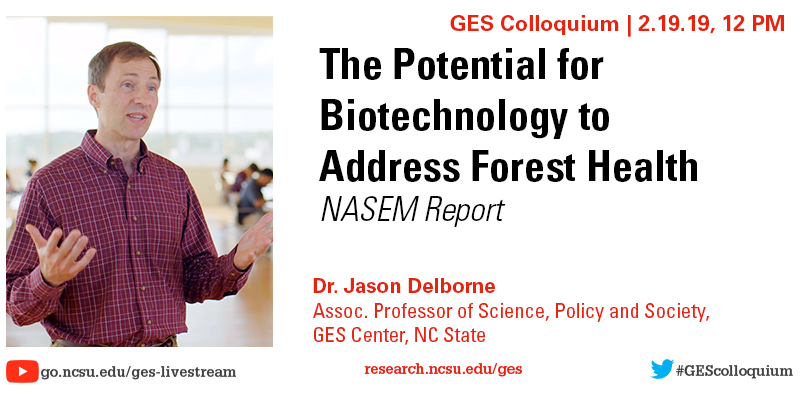
- This event has passed.
GES Colloquium | Jason Delborne: The Potential for Biotechnology to Address Forest Health

GES Colloquium | YouTube: LIVE STREAM
The Potential for Biotechnology to Address Forest Health
Speaker:
Dr. Jason Delborne, Assoc. Professor of Science, Policy, and Society, GES Center, NC State (link, twitter)
Abstract:
In 2018, the National Academies of Sciences, Engineering, and Medicine formed a committee of experts to explore the potential for biotechnology to address forest health. The committee focused on threats to forest health from pests and pathogens and considered challenges and opportunities of biotech trees (genetically engineered or gene-edited) as solutions. NASEM released this report in January 2019, and Jason participated in the public release of this report in Washington, DC and a session at the AAAS annual meeting to summarize findings of the report.
Related reading:
- NASEM Forest Biotech report, highlights, and webcast here.
- The Conversation: Can genetic engineering save disappearing forests?
Bio:
Dr. Jason Delborne is Associate Professor of Science, Policy, and Society in the Department of Forestry and Environmental Resources in the College of Natural Resources. Jason has participated in two ad-hoc committees for the National Academies of Sciences, Engineering, and Medicine (NASEM) – the first focused on gene drives, and the second on forest biotechnology (the subject of this presentation).
Jason came to NC State in 2013 to join the Genetic Engineering and Society faculty cluster. He serves on the GES Executive Committee and coordinates the GES Colloquium this year. Jason received a B.A. in Human Biology from Stanford University and a Ph.D. in Environmental Science, Policy, and Management from the University of California, Berkeley. His research, which draws on the interdisciplinary field of Science, Technology, and Society (STS), explores highly politicized scientific controversies with particular attention to interactions among policymakers, scientists, and the public. In particular, he investigates how communities, stakeholders, and publics can be engaged in the governance of emerging technologies.
WordPress database error: [Unknown column 'wp_tec_occurrences.start_date' in 'SELECT']SELECT SQL_CALC_FOUND_ROWS wp_posts.*, CAST( wp_tec_occurrences.start_date AS DATETIME ) AS event_date
FROM wp_posts LEFT JOIN wp_term_relationships ON (wp_posts.ID = wp_term_relationships.object_id) LEFT JOIN wp_postmeta ON ( wp_posts.ID = wp_postmeta.post_id AND wp_postmeta.meta_key = '_EventHideFromUpcoming' ) LEFT JOIN wp_postmeta AS mt1 ON ( wp_posts.ID = mt1.post_id )
WHERE 1=1 AND wp_posts.ID NOT IN (12324) AND (
wp_term_relationships.term_taxonomy_id IN (73,89,146,149,316,590)
OR
wp_term_relationships.term_taxonomy_id IN (45)
) AND (
wp_postmeta.post_id IS NULL
AND
( mt1.meta_key = '_EventStartDate' AND CAST(mt1.meta_value AS DATETIME) >= '2026-02-13 20:09:12' )
) AND wp_posts.post_type IN ('post', 'page', 'attachment', 'tribe_venue', 'tribe_events', 'tribe_event_series') AND ((wp_posts.post_status = 'publish'))
GROUP BY wp_tec_occurrences.occurrence_id
ORDER BY event_date ASC, wp_posts.post_date ASC
LIMIT 0, 3